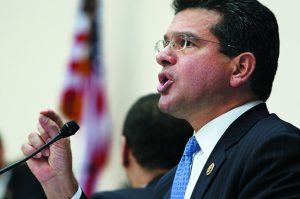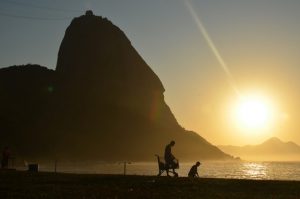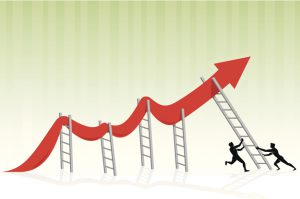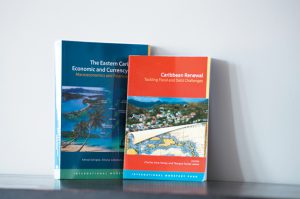
Puerto Rico Deserves Better from Washington
The United States consists of 50 states, the District of Columbia, and five U.S. territories — one of which is Puerto Rico. Individuals born in Puerto Rico are U.S. citizens, but island residents cannot vote for president or senators. The territory has a single delegate in the U.S. House of Representatives who can vote in … Read more

What an Economic Recovery in Brazil Might Look Like
Now might seem like an odd time to look for signs of hope in Brazil. Dilma Rousseff has an approval rating of just 10 percent, she faces possible impeachment proceedings, scandal has frozen activity at the country’s biggest companies, inflation runs around 10 percent and the economy is expected to shrink 3 percent this year. … Read more

Can digital sharing economy platforms pull Latin America’s informal sector into the mainstream? Yes
The struggle between old and new forms of economic development, and efforts to strike a balance between them, will be a defining feature of society and business in the future. The sharing economy is still a poorly understood concept.1 It has been defined as “an economic system in which assets or services are shared between … Read more

Can digital sharing economy platforms pull Latin America’s informal sector into the mainstream? No
A bloated informal sector has long been a nagging structural problem in Latin America and in the developing world more generally. However, over the past few decades, it has proliferated as a result of the withdrawal of the state from market and social regulation. In particular, it has grown as governments have undertaken structural adjustment … Read more
Mexico’s ‘soda tax’ leads families to cut back
Nearly a year after former Mayor Michael Bloomberg’s anti-soda efforts fell flat in New York City, makers of sugary beverages still have plenty to worry about. In March, the first so-called soda tax in the U.S. went into effect in Berkeley, California, earning the city $116,000 in the first month alone. Legislation to tax sweetened beverages is reportedly coursing its way through statehouses in … Read more
Brazil: Up for Sale
Brazil is up for sale, and bargain-hunters from Sam Zell to Stephen Schwarzman are looking for deals. If the country’s economy could be spread onto a monopoly board, distressed domestic utilities like Companhia Energética de Minas Gerais S.A. (Cemig) would be selling for a bargain, while infrastructure like airports and railroads would be begging for … Read more
Brazil’s Lower House Passes Amendment to Austerity Bill in Setback for Government
On Wednesday, Brazil’s Chamber of Deputies passed its second austerity bill in a week, just hours before approving an amendment that changed the bill’s direction and increased federal spending for retirees. If passed by the Senate, the amended bill faces a possible presidential veto and represents a roadblock to the government’s strategy for increasing revenues. … Read more
Unpopular Austerity Measures May Be Brazil’s Best Path to Growth
A proposed government austerity package may keep Brazil from a credit rating downgrade, but could cost President Dilma Rousseff some of her biggest supporters: the country’s labor unions. Lawmakers in Brazil’s lower house passed a proposed bill this week that would limit thousands of workers’ access to social security benefits. The MP 665 bill was … Read more

The Latin American Growth Slowdown
In January, the International Monetary Fund (IMF) updated its growth forecasts—and the news was not uplifting for Latin America and the Caribbean. Average regional growth for 2015 was revised downward from 2.2 percent to 1.3 percent. The report forecast that Brazil, the region’s largest economy, would remain stagnant for another year, while the economies of … Read more

The Caribbean’s Fiscal and Economic Challenges
Pack your bags. The vacation is over. This was the panorama of the Caribbean in 2008 and 2009, when the Great Recession emptied the islands’ beaches of tourists and dried up foreign direct investment for hotels, condos and restaurants. Current account and fiscal deficits widened in many of the Caribbean nations, and belt-tightening was the … Read more

Is Bitcoin Latin America’s Next Big Thing?
The new technology for financial transactions is a boon for people who lack access to traditional banks and financial systems. The historic surge of global Internet access and usage underlines the tremendous potential of the technology known as Bitcoin.* In two decades, the number of Internet users worldwide grew from approximately 25 million in 1994 … Read more

Fresh Look Reviews
Fresh, unique perspectives on recent books from across the hemisphere originally published in English, Spanish and Portuguese.
Brazilian Economy Projected to Suffer Worst Contraction in 25 Years
Brazil’s economy is expected to contract by 0.83 percent this year and inflation to climb to 8.12 percent, according to the Brazilian Central Bank’s weekly survey of financial experts, which was released yesterday. The growth forecast for 2016 was also lowered from 1.3 percent last week to 1.2 percent this week. According to Bruno Rovai, … Read more
Monday Memo: U.S.-Cuba Talks — Colombia Peace Talks — Latin American Currencies — New Uruguayan President — Peruvian Ecotourism
This week’s likely top stories:U.S.-Cuba talks promising; New delegation for FARC peace talks; Dollar strengthens against Latin American currencies; Tabaré Vázquez takes office; Peruvian businesses to learn from Costa Rican ecotourism. U.S.-Cuba Normalization Talks Promising: After two rounds of talks—one in Havana last month and the second in Washington DC on Friday—the U.S. and Cuba … Read more
La barbarie venezolana
El año comenzó con eventos que conmocionaron al mundo y llamaron a reflexionar sobre seguridad, radicalismo y civilización. Venezuela no fue inmune al contexto internacional. El 31 de enero de 2015, Caracas difundió una nota de pesar por el asesinato del periodista japonés Kenji Goto. En tres párrafos, el presidente Nicolás Maduro condenaba “enérgicamente” su decapitación. En las … Read more


